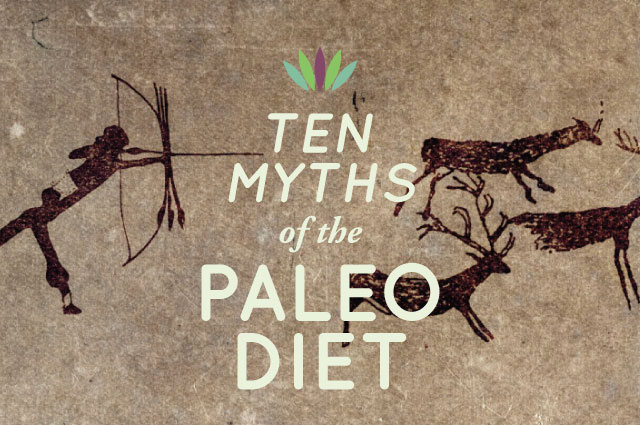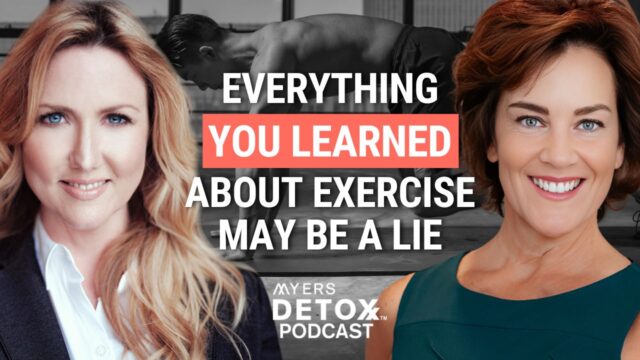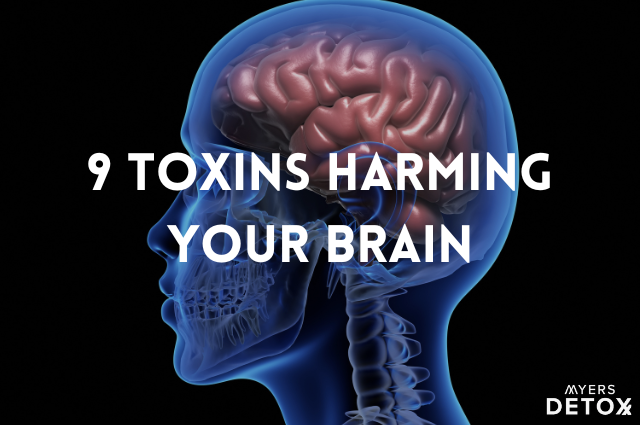There are a lot of misconceptions about the Paleo Diet that I wanted to dispel! So many people assume it’s a high meat diet or there are too many foods that must be excluded from the diet. Allow me to clear things up!
1. Paleo is too Strict
There really isn’t just one Paleo diet, because people make different interpretations about what the term means for them.
As Diane Sanfilippo of Balancedbites.com puts it, “Paleo is a template, not a dietary prescription. There is no one cookie cutter ‘Paleo’ diet.”
Many books have been written about Paleo eating, and each one includes the author’s suggestion about what that looks like. In fact, following a Paleo diet is more about following certain guidelines, with the strictest being eliminating grains, legumes, dairy, and sugar that mimics how our ancestors ate tens of thousands of years ago. Most others advocate a Paleo version, including my Modern Paleo, that advocates the exclusion of grains, dairy for a time to determine sensitivities to them and then incorporating them slowly to see which work for you. It’s about creating Your Personal Paleo Code, Chris Kresser’s new book on personalizing Paleo for you. A general rule of thumb is the sicker you are, the stricter you should be on Paleo.
2. Paleo is a High Meat Diet
Wrong. Paleo is actually a high veggie diet. The diet consists of roughly 70% vegetables. You should be wary of any diet that does not advocate you eat about 70% vegetables in your diet, barring needed dietary modifications based upon specific health conditions. Of course you’re eating meat on a Paleo diet, but the amount varies around individual tolerances in the 10-30% range. Paul Jaminet, author with his wife, of the Perfect Health Diet says you should eat about .5-1 pound (.22-.45 kg) of meat per day. Any more animal protein than this can lead to health problems and reduce life span. (2) This should include fresh red meat at least once a week – grass fed, of course!
3. Paleo is too Low Carb
No. It is not, by definition, a low-carbohydrate diet. In practice, it may or may not be, depending on the foods chosen. Sweet potatoes, yams, winter squash, starchy fruits, even white potatoes are eaten by Paleo folks who need more carbohydrates to fuel an active lifestyle. Additionally, my take on Paleo, Modern Paleo, and many others in the Paleo movement advocate eating white rice and non-gluten grains as long as you tolerate them.
4. Paleo is too expensive
My answer to this is you pay for quality food or pay for the doctor, medications and nursing homes later. You pay at some point so you might as well pay now and eat damn good. Americans spend the smallest percentage of their income on food compared to most industrialized countries – and our poor health as a nation reflects this choice.
We need to spend more money on food to salvage our health. We need to think in terms of nutrient density and buying higher quality eggs, meat and dairy that cost more. You get what you pay for – pastured eggs might be twice as expensive but you get 2-3 times or more the nutrition. You’ll eat the same amount of calories but get exorbitantly more nutrition per bite.
As with any real foods diet, there are resources out there to help you shop on a budget. I save money by not buying bread, grain products, cheese, ice cream and pie. I pay half of what I would at Whole Foods by getting my veggies at the farmer’s market. Or grow your own veggies. Join a coop. Go in with a few families to buy half a grass fed cow or pig for as low as $3.50 a lb or half kilo. Read my article Affordable Food or take a gander at Robb Wolf’s Paleo on a Budget Guide.
5. Meat Eaters Don’t Live as Long as Vegetarians
Do vegetarians live longer than carnivores? Many early, poorly done studies show that vegetarians live longer than meat eaters. This incorrect finding convinced me to go vegetarian, which I did for two years because I want to live a long time. Lierre Keith, in her brilliant book, The Vegetarian Myth, says that census records prove that vegetarians do not live longer than meat eaters, no matter what research says. (5) But let’s look at the research anyways.
If eating meat increases heart disease risk, as is commonly believed in the medical community, we might expect lower rates in vegans and vegetarians. Early studies suggested this was true, but later, better-controlled studies suggest it’s not. Most early studies were poorly designed and subject to confounding factors. Vegetarians tend to be more health conscious on average than the general population – this increases their life span. It’s not due to excluding meat. Other factors explain their longevity, such as more exercise, less smoking and drinking, etc.
This evidence also highlights the fact that any health issues associated with meat eating may not come from the meat per se, but a relative absence of other healthier foods. For example, in this study, vegetarians generally ate more vegetables, fruits and nuts. In fact, this study found evidence that the apparent health benefits of vegetarianism were tied not so much to the absence of meat, but to an increased consumption of healthier foods overall. (1)
Newer, higher quality studies that have attempted to control for these confounding diet and lifestyle factors haven’t found any survival advantage in becoming vegetarian. For example, one study compared the mortality of people who shopped in health food stores (both vegetarians and omnivores) to people in the general population. They found that both vegetarians and omnivores in the health food store group lived longer than people in the general population. (4) This suggests that eating meat as part of a healthy diet does not have the same effect as eating meat as a part of an unhealthy diet. These same findings were confirmed in a very large study performed in the U.K. in 2003 with 65,000 subjects. This study did not observe a difference in mortality between vegetarians and omnivores. (3)
Many vegetarian books and websites cite studies on Seventh-day Adventists, many of whom are vegetarian. These major studies found vegetarians to be at lower risk of death compared to non-vegetarians. However, many other studies do not. And, actually, when all the results were put together, vegetarianism does not confer any benefit in terms of overall risk of death. (3) In other words, the overall result in reviewing all the research runs counter to the idea that vegetarianism is linked with improved longevity.
Vegan and vegetarian diets almost invariably result in numerous vitamin, mineral and nutrient deficiencies such as B12, B6, D, zinc, iron, iodine, taurine and omega-3 fatty acids. When you’re eating a diet full of antinutrient foods like grains and legumes and suffering from numerous nutrient deficiencies, which is almost unavoidable on the vegetarian diet, how people postulate that vegetarians live longer than meat eaters is beyond me.
6. Didn’t Cavemen Only Live to 30?
Many articles about Paleo claim that cavemen only lived to 30 years of age. That’s half right. If a caveman made it past age 20 he typically lived to 60 years of age. The problem with Paleo longevity statistics is they factor in infant mortality. Death rates were high under the age of 5. So, the average age of longevity at 30 many read about is an average of those who died in infancy and those who died naturally of old age. Other factors included infectious disease, predatory animals and inferior shelter.
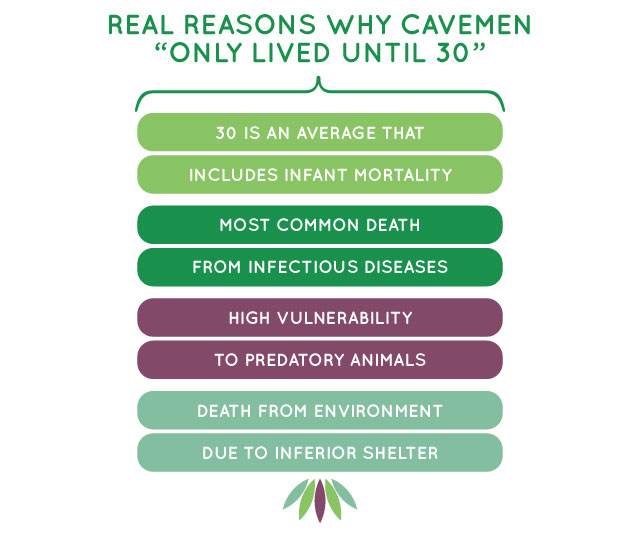
Let’s face it. Cavemen lived a difficult existence. They worked really hard for every morsel of food they put in their mouths. Much of their energy was spent foraging and hunting for animals, which they did in the merciless sun all day. They had to deal with warring tribes. They had to brave the seasons without heaters and air conditioners. Life was tough. Can you imagine living outdoors and living off the land your entire life? You’d be pretty worn out by the time you were 60!
7. We Should Live Like our Ancestors Because We’re Still Genetically the Same
A lot of people in the ancestral community trumpet how our genes are virtually identical to those of our Paleolithic ancestors, thus we should live and eat like they did. When you really think about it, it is a bit ridiculous that a group of people that claims to take an evolutionary approach to life shows little understanding of evolution. Human beings and chimps have virtually identical genomes to the tune of 99.5%. The difference between a human being and a chimp is in gene expression in the epigenome. Just because two species have similar genes does not mean that they will both thrive in similar environments or with similar food sources. One of the mechanisms through which adaptations arise is a change in gene expression – called epigenetics. Different foods and lifestyle choices turn on and off different genes.
It would be absurd to suggest that the epigenome of modern humans is identical to that of our Paleolithic ancestors, given the substantial changes in environment and food that have occurred since that era. Epigenetic changes can happen very quickly. Different food sources create pressure for genetic changes, which can happen more quickly than most people think. For instance, lactase persistence, or the ability to digest lactose into adulthood, is one of those changes that have happened within the last 8000 years. This is actually pretty quick in terms of evolutionary history. This lays the groundwork for our next misconception regarding the assumption that we haven’t adapted to new foods since Paleolithic times.
8. We Haven’t Adapted to New Foods Introduced by Agriculture
The theory goes something like this: We evolved over millions of years without consuming the foods available after the advent of agriculture. Hence, we’re not adapted to these foods. But this assumes that a species isn’t adapted to a food because it’s never consumed it. And if you look at the evolutionary record, that’s incorrect. There are plenty of examples throughout evolution where species discover novel sources of food and thrive on them. Like humans and meat. Humans started out by eating fruits, plants and insects. Then they scavenged bone marrow from bones and brains from skulls and eventually became some of the best hunters on the planet. This changed our physiology. After introducing meat into our diet, we went from having a much larger gut that was good for fermenting rough cellulose and carbohydrate to a much smaller gut and a bigger brain better adapted to the digestion of animal protein. So, it goes without saying that when we discover new foods, we are able to adapt to them, some more slowly than others. That’s why some people can tolerate grains and dairy, while others can’t. But there’s another reason for these differences in food tolerances.
Chris Kresser made a very interesting speech at the Ancestral Health Symposium in 2013. He postulated that the reason we don’t tolerate grains and other foods that are not Paleo so well is not because we can’t digest them, but because we’re missing the crucial gut bacteria needed for their digestion. Many hunter-gatherer cultures discovered by Weston A. Price thrived on diets comprised of grains, dairy and other foods not considered Paleo with virtually no disease. He studied the people in the Lötschental Valley in Switzerland and the Scottish and Gaelic, all of whom relied on grains and dairy as staples in their diet. Of course, they fermented (soaked) these grains – something we’re not doing. And then there are contemporary agricultural communities in South America and other parts of the world that rely heavily on grains, yet autoimmune disease and asthma, etcetera are really rare in those places. How could this be if grains are so detrimental to our health?
A theory that’s prevalent in the Paleo community goes something like this: the shift from a hunter-gatherer lifestyle to agriculture led to an increase in disease and a decline in health. There’s no doubt this is true, but the idea that compounds like gluten, saponins, lectins and capsaicin in peppers were responsible for this decline isn’t very well supported by the evidence. Significant increases in chronic inflammatory disease didn’t happen for the most part until the last hundred years. Yet, the change from a hunter-gatherer lifestyle to agriculture happened roughly 10,000 years ago. So there has to be something else that explains this decline in health. If it were true that gluten and lectins in grains significantly increased the risk of disease, they would have done that long ago.
Chris Kresser postulates a very interesting theory that it’s possible that these potentially harmful compounds in new foods are not a significant risk factor for inflammatory disease as long as the Paleolithic microbiome – our gut bugs – is still intact. When our microbiome is depleted or deficient, then these foods can become risk factors for inflammatory disease.
Repairing our gut flora – this microbiome – is not as simple as supplementing with probiotics. Supplementation is great, and highly recommended, but the problem lies in how modern life destroys the probiotics in our gut. The dysbiosis in our guts today began with fewer women breastfeeding, which lays the groundwork for a healthy gut. The whole point of colostrum, the substance that comes before breast milk in the first week of breastfeeding, is to populate the gut with healthy bacteria. Then we eat tons of sugar throughout childhood, which causes an overgrowth in yeast and bad gut bacteria. We routinely pop antibiotics like candy at the slightest hint of infection, killing precious good bacteria. Due to refrigeration, we eat far less fermented foods – a preservation method that was required to preserve food for thousands of years. Fermented foods contains billions, even trillions, of probiotics that help maintain a healthy gut. We are destroying our health and our natural gut biodome with these practices and many others, like the use of antibacterial soaps.
Unprotected from adequate colonies of probiotics, we develop leaky gut, food intolerances, allergies, autoimmune issues, inflammatory conditions like asthma and a host of other diseases. These are the fastest growing subsets of illnesses today. They are the hidden costs of modern hygiene.
Chris Kresser went on to say in his speech that if we still had the Paleolithic microbiome intact, we could tolerate grains and all of these compounds with no problem like our recent hunter-gatherer friends. This point is key because it resolves some of the apparent conflicts in the ancestral paradigm. It can explain the reason many cultures ate grains for thousands of years and the health conditions we attribute to grains were incredibly rare. Of course, our health and our height declined to a degree after the farming of grains, but this does not explain what is happening to our health today.
You can expand your Paleo diet. Some people who spend time overhauling their gut bacteria are able to introduce grains, dairy or other non-Paleo foods – even if they’ve had previous intolerances – and do just fine. It also explains why some people are able to tolerate those foods with apparently no problems while others can’t. So, work on good gut health and you will be able to safely enjoy grains and dairy and other foods not Paleo given you don’t have food intolerances to them for other reasons.
9. The Paleo Diet Raises Cholesterol
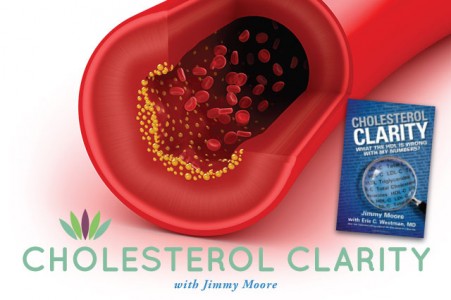 Have you heard that fat doesn’t make you fat? Likewise, eating cholesterol-rich foods do not raise your cholesterol in any meaningful way. Your liver makes 85% of your cholesterol regardless of consumption of cholesterol in response to a number of different factors – none of them involving eating red meat and eggs. Typically, eating grains and sugar are the real culprits – foods excluded on the Paleo diet.
Have you heard that fat doesn’t make you fat? Likewise, eating cholesterol-rich foods do not raise your cholesterol in any meaningful way. Your liver makes 85% of your cholesterol regardless of consumption of cholesterol in response to a number of different factors – none of them involving eating red meat and eggs. Typically, eating grains and sugar are the real culprits – foods excluded on the Paleo diet.
In fact, countless stories abound of embarking on a Paleo diet and cholesterol numbers going down. Hungry for more info on this subject? Listen to my podcast with the legendary Jimmy Moore about his new book Cholesterol Clarity. Learn the real causes of high cholesterol. I assure you it’s not the Paleo diet.
10. Cavemen Were Disease Free
Au contraire mon frère. Cavemen had signs of heart disease here and there. Remember, many diseases have a genetic component, which even cavemen cannot escape. They carried them just the same as we did but lived a far healthier lifestyle so they were less likely to activate those genes. Some diseases have very strong genetic components that will be expressed no matter how healthy one lives. So, some of our Paleo munching cavemen croaked of cancer, but this was very rare. Most of them died of battle wounds and accidents, but a few here and there dropped dead of heart attacks, too.


